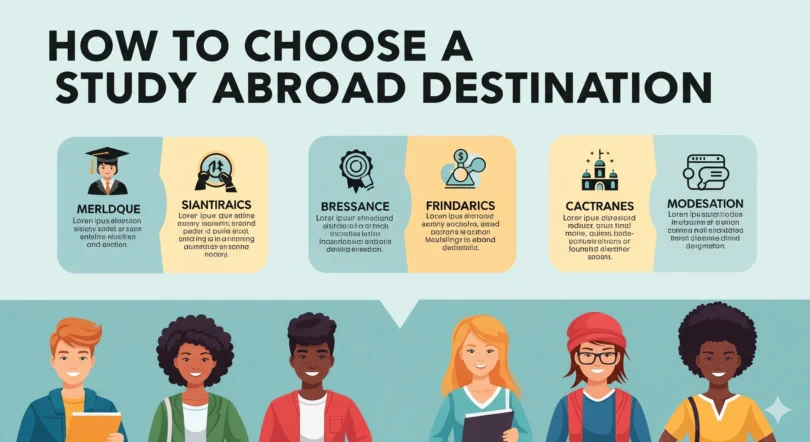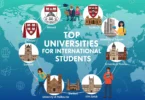How to Choose a Study Abroad Destination
Introduction
Choosing the right study abroad destination is one of the most important decisions for any international student. Over my 15 years as a study abroad consultant, I have helped hundreds of students navigate this critical step, balancing academic goals, financial considerations, personal preferences, and career prospects.
In this comprehensive guide, I’ll walk you through step-by-step strategies to select a destination that not only meets your educational aspirations but also enriches your personal growth and future career.
Why Choosing the Right Destination Matters
The country and university you choose will impact:
- Academic Quality: Different countries specialize in different programs. Germany excels in engineering and science, the USA offers diverse research opportunities, and the UK is strong in business and humanities.
- Financial Planning: Tuition, living costs, and scholarships vary significantly. Selecting an affordable destination can prevent unnecessary stress.
- Cultural Adaptation: Your comfort with local culture, language, and lifestyle affects your overall experience and academic performance.
- Career Opportunities: Work visas, internships, and post-study employment options differ by country. Choosing wisely can enhance your global employability.
Consultant Tip: Prioritize destinations that align with your long-term career and personal goals rather than popularity or social influence.
Step 1: Define Your Academic Goals
Ask yourself:
- What field of study am I passionate about?
- Do I prefer practical hands-on learning, research-based education, or creative programs?
- Which country is recognized for excellence in my field?
Example: For engineering students, Germany or Canada might be ideal due to strong technical programs and research opportunities. For business students, the UK or the USA often provides a variety of top-ranked programs.
Consultant Insight: Make a list of programs and universities in each destination, then compare the curriculum, faculty, and facilities.
Step 2: Assess Financial Considerations
Studying abroad involves tuition, accommodation, travel, and daily living expenses. Consider:
- Tuition Fees: Some countries, like Germany and Norway, offer low or no tuition for international students, while the USA and UK may have higher fees.
- Living Costs: Housing, food, transportation, and healthcare vary. For example, Scandinavian countries are expensive, whereas Eastern Europe is more affordable.
- Scholarship Opportunities: Investigate destination-specific scholarships, grants, and financial aid programs.
Consultant Tip: Create a budget plan including all potential costs and funding sources before narrowing down your options.

Consider Language and Cultural Factors
Step 3: Consider Language and Cultural Factors
Language proficiency and cultural compatibility significantly affect your study abroad experience:
- Language Requirements: While many programs are offered in English, knowing the local language can help with daily life and part-time work.
- Cultural Adaptation: Reflect on how easily you can adapt to new social norms, weather conditions, and lifestyle.
Consultant Advice: Attend pre-departure orientations, language courses, or connect with alumni from your prospective destinations.
Step 4: Evaluate Post-Study Opportunities
Career growth after graduation is a key factor in choosing a destination:
- Work Visas: Check the country’s policies for international graduates. Germany offers post-study work visas, while the UK recently extended its Graduate Route.
- Industry Connections: Universities with strong links to local industries provide better internship and employment opportunities.
- Global Recognition: Consider how a degree from your chosen destination will be perceived globally.
Consultant Insight: Align your destination choice with your career aspirations and long-term professional goals.

Research Universities and Programs
Step 5: Research Universities and Programs
Once you’ve shortlisted destinations, evaluate universities based on:
- Program Quality: Check curriculum, faculty expertise, research facilities, and international rankings.
- Student Support: Look for counseling, career services, language support, and housing assistance.
- Student Life: Clubs, societies, cultural activities, and networking opportunities enhance your overall experience.
Consultant Tip: Review university websites, attend virtual fairs, and talk to current students to get insider knowledge.
Step 6: Check Visa and Immigration Policies
Visa regulations can impact your timeline and planning:
- Eligibility Requirements: Academic qualifications, financial proof, and language proficiency may be required.
- Application Timeline: Some countries require early submission, up to 12 months in advance.
- Health & Insurance: Ensure you understand health insurance requirements and other legal obligations.
Consultant Advice: Consult official immigration websites and experienced advisors to avoid errors and delays.

Factor in Lifestyle Preferences
Step 7: Factor in Lifestyle Preferences
Lifestyle plays a vital role in your happiness abroad:
- Climate: Can you adjust to cold winters in Germany or hot summers in Australia?
- Urban vs. Rural: Do you prefer a bustling city or a peaceful town?
- Social & Extracurricular Opportunities: Clubs, sports, volunteering, and cultural events enhance personal growth.
Consultant Insight: Visit forums or social media groups to understand the real-life student experience in your prospective destinations.
Step 8: Make a Decision
After considering all factors—academics, finances, culture, post-study opportunities, and lifestyle—rank your destinations and universities.
- Create a pros and cons list for each option.
- Consult with advisors or mentors for a reality check.
- Choose the destination that balances your academic aspirations, financial capacity, and personal comfort.
Consultant Advice: Never rush this decision; investing time in careful research ensures long-term satisfaction and success.
Conclusion
Choosing the right study abroad destination is more than selecting a university—it’s about shaping your future. By evaluating academic quality, financial aspects, cultural adaptation, and career opportunities, you can make an informed decision that benefits both your education and personal growth.
As a seasoned study abroad consultant, my advice is to prioritize long-term goals, remain realistic about resources, and embrace the adventure. With proper planning, research, and guidance, studying abroad can be a life-changing experience that opens doors to global opportunities and personal fulfillment









